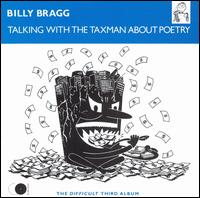Talking with the Taxman About Poetry
| Talking with the Taxman About Poetry | ||||
|---|---|---|---|---|
 | ||||
| Studio album by | ||||
| Released | 22nd September 1986[1] | |||
| Recorded | March–July 1986 | |||
| Studio | Livingston Studios, London | |||
| Genre | Folk punk | |||
| Length | 38:06 | |||
| Label | Go! Discs (UK) Elektra (US) | |||
| Producer | Kenny Jones, John Porter | |||
| Billy Bragg chronology | ||||
| ||||
| Review scores | |
|---|---|
| Source | Rating |
| AllMusic | |
| The Encyclopedia of Popular Music | |
| Rolling Stone | |
| The Rolling Stone Album Guide | |
| Spin Alternative Record Guide | 8/10[6] |
| The Village Voice | B+[7] |
Talking with the Taxman About Poetry is the third album by Billy Bragg, released in September 1986. With production by John Porter and Kenny Jones, Talking with the Taxman About Poetry featured more musicians than Bragg's previous works, which were generally little more than Bragg himself and a guitar.
There were two singles released from the album. While "Levi Stubbs' Tears" peaked at No. 29 in the UK, the follow-up "Greetings to the New Brunette" fell short, only managing No. 58 a few months later.
Background[]
The album's title is also the title of a Vladimir Mayakovsky poem, which appears as part of the liner notes.
The song "There Is Power in a Union" is based on the song "Battle Cry of Freedom".
"Levi Stubbs' Tears" refers to songwriter Barrett Strong, producer Norman Whitfield, the members of the Holland-Dozier-Holland songwriting and production team as well as Levi Stubbs and the Four Tops.
The original album cover has the subtitle "The Difficult Third Album".[8]
Critical reception[]
Trouser Press wrote that the album "is a great leap forward, the deft application of understated instrumental accompaniment on some of Bragg’s best-ever songs."[9]
Accolades[]
The album was also included in the book 1001 Albums You Must Hear Before You Die.[10]
Track listing[]
All tracks written by Billy Bragg, except where noted.
Disc one[]
- "Greetings to the New Brunette" – 3:29
- "Train Train" (Zenon De Fleur) – 2:11
- "The Marriage" – 2:30
- "Ideology" (Bragg, Bob Dylan) – 3:27
- "Levi Stubbs' Tears" – 3:28
- "Honey, I'm a Big Boy Now" – 4:05
- "There Is Power in a Union" (Bragg, George Frederick Root) – 2:47
- "Help Save the Youth of America" – 2:45
- "Wishing the Days Away" – 2:28
- "The Passion" – 2:52
- "The Warmest Room" – 3:55
- "The Home Front" – 4:09
Disc two (2006 reissue)[]
- "Sin City" (Gram Parsons, Chris Hillman) – 3:34
- "Deportees" (Woody Guthrie, Martin Hoffman) – 4:03
- "There is Power in a Union" (instrumental) (George Root) – 3:16
- "The Tracks of My Tears" (Smokey Robinson, Warren Moore, Marvin Tarplin) – 2:56
- "Wishing the Days Away" (alternate version) – 2:32
- "The Clashing of Ideologies" (alternate version) – 2:52
- "Greetings to the New Brunette" (demo version) – 3:57
- "A Nurse's Life is Full of Woe" – 2:48
- "Only Bad Signs" – 3:10
- "Hold the Fort" (traditional) – 1:47
Personnel[]
Musicians[]
- Billy Bragg – guitars (acoustic and electric), vocals
- Kirsty MacColl – vocals
- Ken Craddock – organ, piano
- Kenny Jones – percussion
- Johnny Marr – electric guitar
- Simon Moreton – percussion
- John Porter – guitar, mandolin, bass guitar, slide guitar
- George Shilling – percussion
- Bobby Valentino – violin
- Dave Woodhead – trumpet, flugelhorn
- Hank Wangford – vocals and mandolin on "Sin City" and "Deportees"
- Robert Handley – vocals on "Hold the Fort"
Production[]
- Kenny Jones – producer
- John Porter – producer
- Grant Showbiz – reissue producer
- George Shilling – technician
- Pennie Smith – photography
References[]
- ^ https://www.billybragg.co.uk/js_albums/talking-with-the-taxman-about-poetry
- ^ Deming, Mark. "Talking with the Taxman About Poetry – Billy Bragg". AllMusic. Retrieved 3 June 2013.
- ^ Larkin, Colin (2011). The Encyclopedia of Popular Music (5th concise ed.). Omnibus Press. ISBN 978-0-85712-595-8.
- ^ "Billy Bragg: Talking with the Taxman About Poetry". Rolling Stone: 95.
Bragg's most likable record: The arrangements sand off his splintery edges ...
- ^ Considine, J. D. (2004). "Billy Bragg". In Brackett, Nathan; Hoard, Christian (eds.). The New Rolling Stone Album Guide (4th ed.). Simon & Schuster. p. 101. ISBN 0-7432-0169-8. Retrieved 3 June 2013.
- ^ Weisbard, Eric; Marks, Craig, eds. (1995). Spin Alternative Record Guide. Vintage Books. ISBN 0-679-75574-8.
- ^ Christgau, Robert (24 February 1987). "Christgau's Consumer Guide". The Village Voice. Retrieved 3 June 2013.
- ^ "Talking with the Taxman About Poetry", Billy Bragg, Elektra 9 60502-1 (1986) LP
- ^ "Billy Bragg". Trouser Press. Retrieved 15 March 2021.
- ^ Robert Dimery; Michael Lydon (7 February 2006). 1001 Albums You Must Hear Before You Die: Revised and Updated Edition. Universe. ISBN 0-7893-1371-5.
External links[]
- 1986 albums
- Billy Bragg albums
- Albums produced by John Porter (musician)
- Go! Discs albums